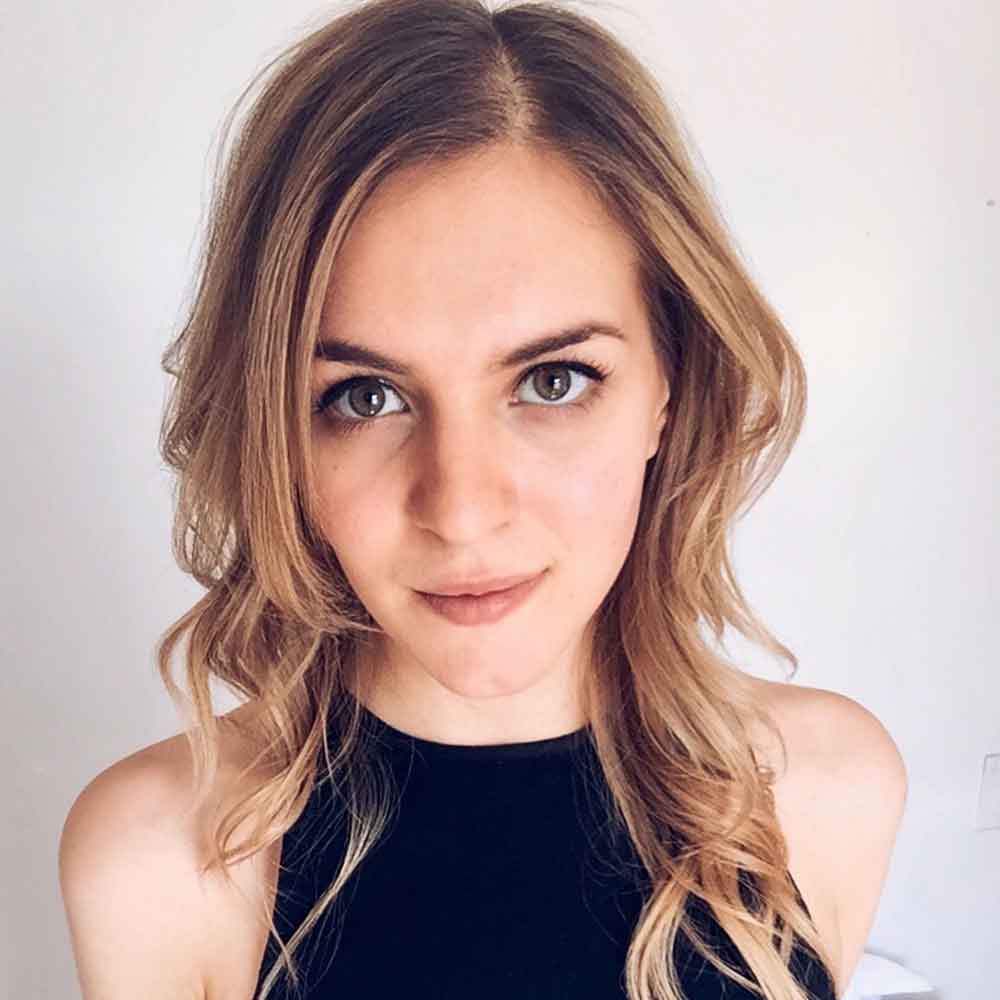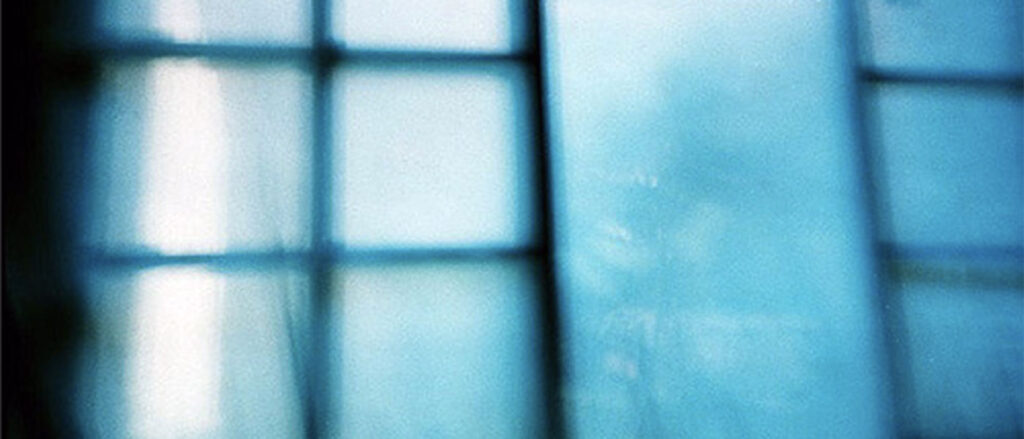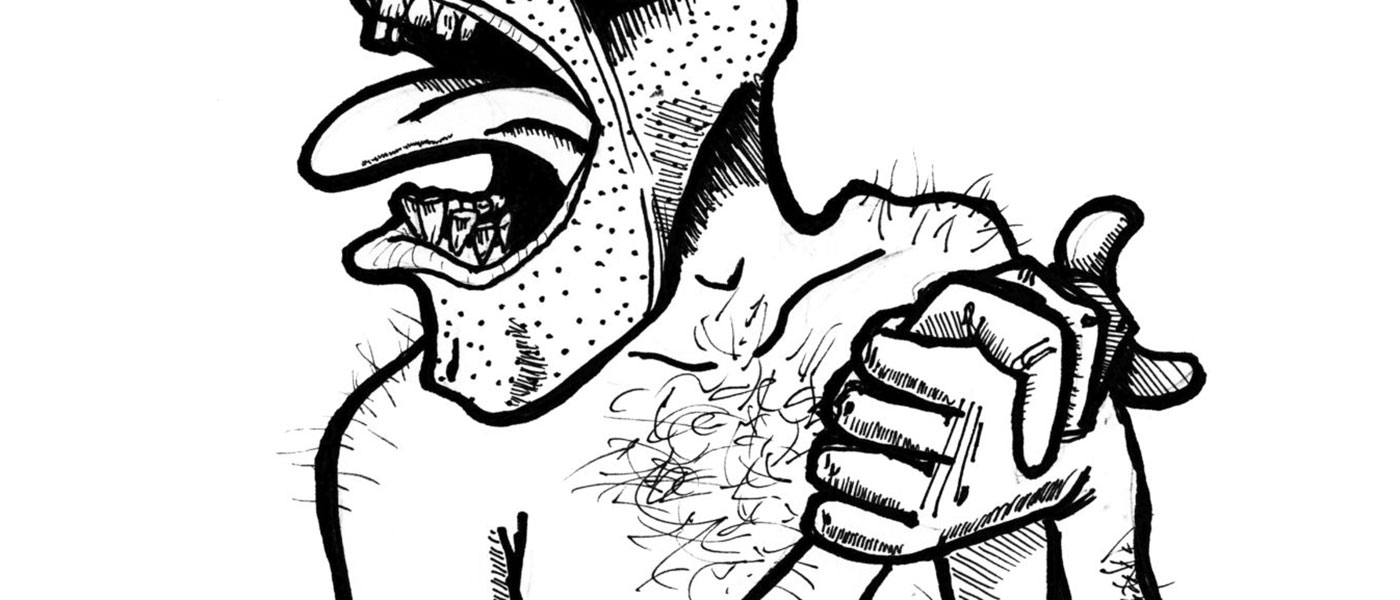For six days after the operation, everything was blue. At first Diane thought she’d evaded all of the potential side-effects; she’d made it from the hospital to their driveway seeing clearly, and felt just fine as Johnny escorted her from the truck to the front door. And then — blink! Suddenly all the blades of grass in her wide, cerulean lawn were whipping together in a cool, almost-winter blue breeze. Of the surgery’s four potential side effects, blueness was by far the most tolerable.
“I got one. I got one!” she said, clapping her hands like a seal: blue. Blue. Blue! Before the operation, Diane and her husband, Johnny, had sat together on the paper-white hospital bed, familiarizing themselves with the potential risks her surgery entailed.
It was voluntary. But it had recently come to pass that if Diane did not get the corrective surgery — the one that would make it impossible for her to conceive — she might not have the funds to afford her contraceptives for much longer, nor rid herself of any…problems should one arise.
And Johnny hated condoms.
So that was that.
Diane had memorized everything, from how other patients had reportedly felt (empty), to the predicted date by which she could anticipate full recovery (eventually). Blueness had seemed laughable in that sterile space, the word so simply printed beside nausea and prolonged heavy bleeding and worst of all fatal stroke, and it still seemed funny now that she had it safe at home.
“Everything blue, huh?” said Johnny, leading her to their bedroom.
“Everything blue,” she said. He kissed her on the forehead and tucked her in snug — as though she were otherwise liable to leave — otherwise liable to go wandering around making a nuisance of herself in the city. Like a baby, she peered out at him from within her bed pram.
Didn’t he know she had sutures to heal?
“How do you suppose Linda is feeling?” she asked Johnny. “Boy, is it snug in here.”
Johnny sat in his straight-backed wooden chair near the window. It was the seat in which he did all his best thinking.
“Ronald called while you were still under. She healed fine — physically, anyway.”
“And Gillian?”
“Some nausea, but only mild. Crying a lot.”
“Dorothy?”
A slant of autumnal sunlight gleamed onto Johnny’s hair through the casement window. Diane watched with a peculiar, hollow feeling as her husband sighed, sending blue dust particles streaming through the air like bubbles through the seascape.
“Dorothy’s doctor told her that she has fibroids distorting the inside of her uterus, and can’t have the surgery.”
“Oh, rats,” Diane wriggled her shoulders under the covers; it really was snug in the bed. “That’s awful news.”
Johnny shrugged.
“Just rotten.”
“I guess.”
“Stinks on ice,” Diane drove the point home.
“I think they’re happy, actually,” Johnny said. “She gets to stay a real woman, with all her parts.”
Diane blinked blue. In her small circle of close women friends, only one gal — Magda — had actually decided not to go under the knife. Something about not wanting to sleep for too long in case Bongo her cat crept up and sucked her soul out through her nose. Everybody else had opted yes — yes to freedom. Yes to the surgeon’s table.
“I’m still a woman,” she said.
The post-op sedatives were working a charm now; everything warm, everything snug, everything blue. How lucky she felt, how deeply satisfied, to be falling asleep there in her swath, with her husband and his aqua hair just like a halo lit up by a blazing star — and it was only Sunday! She had an entire week ahead of her to enjoy.
Outside a pigeon in a bluebird’s costume flew by. The elm in their front lawn was almost barren, its branches stubbornly clinging to the last of its armor. It was better to let things fall sometimes, thought Diane drowsily. It did one good to see all those sapphire petals on the ground, just ready to get swept into a resting pile — a jumping pile. Was there any greater pleasure than that felt by a little body diving in and out of a…? She shook her head. Blue. Piles and piles of leaves.
She opened her mouth to tell Johnny, but decided at the last moment to keep it to herself; instead watching as a butterfly — probably the last of its kind left over from summer — fluttered near the light fixture above her head.
“Johnny,” she murmured. “Butterfly. Cobalt.”
“What’s that?”
“Butterfly.”
Obediently he turned around and looked up at the creature, then back down to Diane tucked in bed, then up, then down, then pursed his lips and returned to the serious task of sitting in his hard-backed thinking chair.
“You sit well,” she praised him warmly; but his body was blurring, poor Johnny. Her mind felt trapped under water. The butterflies swam through the blue ceiling sky.
“Did you know that Magda did call,” Johnny’s voice cut through the current. “While you were getting put under. She was taking a walk, and she passed by the cemetery. The new little plot is almost finished.”
Diane nodded. She was listening. Johnny’s words anchored her; the post-op sedatives were coursing through her, trying to coax her away from him and into an indigo dreamscape. With every new syllable he uttered she felt as though her head broke through a watery surface, bobbing up into a glorious daybreak, before — yank! becoming submerged, again, underwater.
“You know she said the new caskets are beautiful,” he warbled. “Spanning in size — some just as big as a shoebox. Others only as large as, say, the palm of my hand.”
“Come hold my hand.”
“Say,” he said then, all echoes. “Did you know they only made enough to cover a few acres worth or so?”
“Johnny.”
“And meanwhile the dollar store down the block just called in a huge new shipment of clothes hangers…”
“Johnny.”
“Anyway. Magda said she e-mailed the designer before she dropped in; said she was just curious, and wanted to see one of the boxes up close. That’s how come she knows how beautiful they are. She said she cradled a real handsome one — empty, of course. A nice rose gold.”
At some point Johnny had risen from his thinking chair and now he appeared at her side, a shadowy but familiar figure. She saw him glance down at the wedding band on his finger, which looked beryl — could have been ringworm, could have been anything — and was relieved to see him smile. She felt her own hand becoming suddenly encased in his, and allowed him to lift it up until her own fourth finger was smack in her line of vision, her ring winking at her as though to remind her that she, too, appreciated a nice rose gold.
“Yes, yes,” Diane tried to laugh. She paused. For a long moment Johnny stood, a solid mass amid all the undulating blue. Her head was spinning and the butterfly flit and fluttered.
Then:
“I’ll go and get some mothballs for the closet,” Johnny patted her on the head. Her nausea receded. “See if we can’t get that thing out before it ruins our sweaters. When did the winter get here? Here it is. When did it come?”
He padded out of the room with light, careful footsteps and their old oak bedroom door — the one he took special care to polish every Friday evening after dinner — did not creak as he shut it. It just closed.
For a moment Diane did not move — just waited contentedly for the dull blue evening to descend. It had been a curious autumn. Although she’d lived through twenty-nine of them before, she wondered if this November might go down as history’s lightest. The evenings never seemed to darken this year, not until at least 8:00 pm; more than once she’d gone to her seat by the window for an after-dinner cigarette and still somehow caught the tail end of a dim but orange sunset.
Blue.
She could hear Johnny crying through the walls. A surge of emotion suddenly ripped through Diane; a feeling which seemed to suggest to her that perhaps — just perhaps — she ought to sit up; to rise; to tear like animal through her sheet-swaddle shackles; to hunch; to gird her body more conductively for shame; to feel her hollowness and yearn for what was missing. She was intending, wanting, and anticipating to cry.
She should, after all, be mourning her barren belly. Johnny was mourning—now, anyway.
At first when the news had come out — when they’d discovered that her right to fully participate in the goings-on of her body had been minimized — he’d been okay. Happy, even, passing his free evenings out with his friends at McAlister’s, reporting his adventures back to her: once the barkeep had even given him a new whiskey cocktail to sample on the house.
“It was spicy!” Johnny had said.
It was only after she’d booked the surgery that something changed in him — a sudden slump in his shoulders appeared that wasn’t there before. He’d also started to blink in response to Questions.
“Isn’t this wonderful?”
Blink.
“Do you want to go out to dinner tomorrow?”
Blink.
“I’m not doing this to hurt you.”
“We made the right selection — no need to cover your erection!”
“Does it help that I feel just great about it?”
Blink — blinkityblinkblinkblink. The date of the operation loomed nearer, and Johnny had picked up his keys in the end. They listened to jazz on the radio on the drive to the surgeon’s table.
Diane turned now to consider the butterfly. The light fixture hanging above her bed emitted only a dim glow—not weak enough that it had begun to flicker yet, but that time was fast approaching. The room was lined with windows facing the East, but for all the stubborn, glimmering sunlight, the butterfly seemed to favor the artificial glow of the light bulb. She watched as the butterfly tensed its delicate legs and then ascended, beelining for the bulb; always, it maintained only a minute’s worth of contact before the heat overwhelmed it. Then it would take a small sojourn over on the bedpost, or the curtain — but always, after a moment, it returned to the bulb.
Now come on, Diane thought, trying to focus. She wasn’t supposed to be minding the butterfly. She was supposed to be mourning — wanted to be mourning, but try as she might she could not manage to inspire the proper feelings of grief into her soul. Instead, she felt angry: angry at Johnny. Angry at her friends. Angry that she couldn’t feel what she really wanted to feel, which was fine — phenomenally.
Diane wriggled her shoulders around in her swaddle and then settled. She remembered reading once that butterfly backs were actually lined with tiny, sensory scales — not dust, like she’d always believed — and those scales gave them their ability to fly. At this juncture in the butterfly’s routine, it had abandoned the light and was resting peacefully near her kneecap. Diane tensed her body. It would only take one half-second. She could reach out with her pinky and sweep just a thimble’s worth of scales off the butterfly’s back — that much and no more. What if she did that? What might happen then?
Her pulse began to quicken. Now this! This was interesting. Should she call Johnny in to witness the sweeping of the dust; the fall of the hero; the frantic flutters of compromised wings as they raged against gravity in a confusing spiral headlong toward earth? The butterfly (well, the moth — Johnny had said it was a moth, blue) would probably manage to land, and then its little legs would work furiously, readying itself for the terrific task of collecting back one speck of the stolen scale-dust at a time. Diane’s breath quickened just imagining it; her arms and hands buzzed with loathing. How long would it take for the moth to reclaim enough dust for its wings — when would it eventually rise and greet the dim light again in its canopy up above? Would it rise? Or might it accept its fate; bow to gravity; live out its earthbound life with only the memory of soaring. Might it actually capitulate?
No, thought Diane. She was sure it would rally. One speck at a time it would persist. And that — that would be something. That would be a demonstration of victory, a reminder of the pride, and the importance of the work — the work — the getting back to work. She stretched out a finger —
“Diane?” The door had not creaked when it opened. Johnny came in with the mothballs and the winter, and then the blue rushed back in. Diane’s muscles relaxed and she sank back down into her swaddle, growing very sleepy and forgetting about the moth.
The next day grew dark early, as did the day after that. Diane knew the blueness was gone when she woke up three dreams later and had come down with her prolonged heavy bleeding. It was red.




